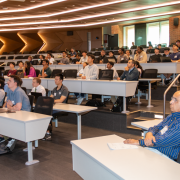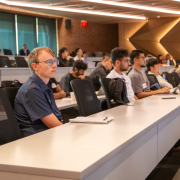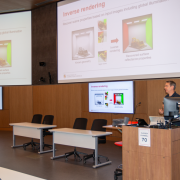Department of Computer Science Hosts Annual Research Day
The University of Maryland’s Department of Computer Science organized its annual Computer and Computational Sciences Research Day on August 22, 2024, at Antinov Auditorium in the Brendan Iribe Center for Computer Science and Engineering. The event, aimed at introducing incoming graduate students to the department's ongoing research, was attended by over 60 Ph.D. and 50 M.S. students.
 Research Day featured presentations on various topics, including artificial intelligence, computer graphics, metacomputing, cybersecurity, machine learning, natural language processing, network systems, programming languages, robotics, virtual reality and visual computing. These presentations allowed new students to familiarize themselves with the department’s research landscape and consider potential areas for their work.
Research Day featured presentations on various topics, including artificial intelligence, computer graphics, metacomputing, cybersecurity, machine learning, natural language processing, network systems, programming languages, robotics, virtual reality and visual computing. These presentations allowed new students to familiarize themselves with the department’s research landscape and consider potential areas for their work.
Professor Amol Deshpande, the recently appointed Associate Chair for Graduate Education, highlighted the event's importance for new students.
“The annual Research Day continues to serve as a great introduction to the diverse range of ongoing cutting-edge research within the department,” Deshpande said. “Its rapid-fire approach, featuring short 10-minute talks by faculty members and researchers in many different subfields of computer science, exposes students to numerous ideas in a short period of time and can spark inspiration to explore new directions."
Deshpande emphasized that the event is particularly valuable for new students, as it helps them navigate the early stages of their academic journey.
“Research Day is especially helpful for incoming students to identify potential advisors they can work with,” he added. “Additionally, the event fosters networking opportunities, allowing students to connect with faculty and peers who share similar research interests, which can lead to future collaborations and mentorship relationships.”
 For many students, the event underscored the innovative and forward-thinking nature of the department's research. Georgios Milis, an incoming Ph.D. student who plans to focus on machine learning, was particularly struck by the novelty of the topics discussed.
For many students, the event underscored the innovative and forward-thinking nature of the department's research. Georgios Milis, an incoming Ph.D. student who plans to focus on machine learning, was particularly struck by the novelty of the topics discussed.
“It was very exciting because all the topics that the presenters were discussing are cutting edge,” Milis said. “There are questions that people weren't dealing with before because they didn't have the tools to deal with them. I liked the talk about fairness and, in general, incorporating intelligent agents into everyday life—technology that wasn't thought of before. A lot of professors are approaching it with different perspectives.”
Ayushi Mishra, an incoming Ph.D. student focusing on cybersecurity and AI, also shared her thoughts on the event.
“I thoroughly enjoyed the event and found all the talks highly engaging,” Mishra said. “Each presentation offered unique insights, but a few were particularly compelling. Ashok Agarwal, Ruohan Gao, Jun Nishida and Huaishu Peng each delivered exceptional work that left a lasting impression on me."
Mishra was also struck by the dynamic approaches highlighted in some presentations.
“Professor Gao’s exploration of capturing intrinsic acoustic properties from scenes was particularly fascinating, revealing a new dimension of acoustic analysis,” Mishra continued. “Meanwhile, Professor Nishida’s discussion on engineering bodies and sustainability was insightful and innovative, blending technical rigor with a forward-thinking approach. His incorporation of cognitive knowledge into the conversation was particularly inspiring, offering a fresh perspective on the intersection of engineering and human understanding.”
 The department's strong ties to various research centers on campus provide students and faculty with numerous opportunities for collaborative research. These centers include the Maryland Cybersecurity Center (MC2), the Human-Computer Interaction Laboratory (HCIL), the Center for Bioinformatics and Computational Biology (CBCB), and the University of Maryland Institute for Advanced Computer Studies (UMIACS), among others. These collaborations are instrumental in maintaining the department’s reputation for excellence in research and education.
The department's strong ties to various research centers on campus provide students and faculty with numerous opportunities for collaborative research. These centers include the Maryland Cybersecurity Center (MC2), the Human-Computer Interaction Laboratory (HCIL), the Center for Bioinformatics and Computational Biology (CBCB), and the University of Maryland Institute for Advanced Computer Studies (UMIACS), among others. These collaborations are instrumental in maintaining the department’s reputation for excellence in research and education.
UMD’s computer science graduate program is highly ranked nationally, recently placing No. 10 among public institutions and No. 17 overall in the 2024 edition of U.S. News & World Report’s “Best Graduate Schools.” The program is also recognized for its strengths in artificial intelligence, theory and programming languages, ranking in the top 25 in these specialties.
—Story by Samuel Malede Zewdu, CS Communications
The Department welcomes comments, suggestions and corrections. Send email to editor [-at-] cs [dot] umd [dot] edu.
